When it comes to exploring Germany, two cities often come to mind: Berlin vs Munich. These vibrant destinations offer a wealth of attractions, unique cultures, and exciting nightlife. Whether you’re planning a trip or just curious, this article will compare and contrast the two cities, helping you discover the differences, similarities, and hidden gems of each city.
From cultural significance to climate, job opportunities to day trips, we’ll dive into all aspects of these incredible cities. Whether you’re drawn to Berlin’s edgy urban flair or Munich’s classic charm, we’ll help you decide which city to visit or include in your travel itinerary.
I’ve lived in both Munich and Berlin. I’d say each city offers appeal depending on your character and where you are at in life.
Berlin – can’t beat the parties, it has a crazy amount of food options and history, so as a single, young couple, no kids kind of place – its hard to beat.
Munich – Is Munich or Berlin prettier? I personally find Munich much more beautiful, and with kids it’s much easier to live here with parks, things to do for kids, and beer gardens with playgrounds inside – a match made in heaven.
I also find many locals very friendly in both cities – of course, there are grumpy ones, but they are everywhere worldwide.
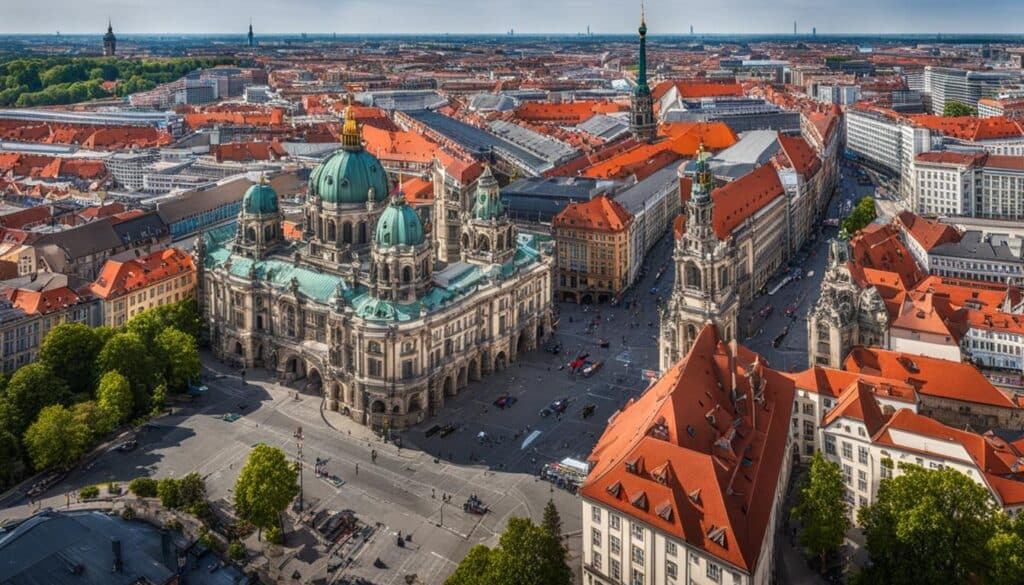
So, sit back and get ready to explore the fascinating world of these two major German cities.
Table of Contents
Key Takeaways:
- Berlin and Munich offer unique charms and attractions for visitors to explore.
- Both cities have their own distinct cultures and nightlife scenes.
- The cost of living is generally lower in Berlin compared to Munich.
- Both cities have efficient public transportation systems.
- Berlin is known for its alternative arts scene, while Munich boasts traditional Bavarian culture.
- Berlin does not have a great getaway seen as Brandenburg has limited things to do
City Profiles Compared
When comparing Berlin and Munich, it is important to understand the unique characteristics of each city. Berlin, as the capital of Germany, has a population of approximately 3.7 million people. It is known for its vibrant arts scene, rich history, and alternative culture. The city attracts artists, musicians, and creative individuals worldwide, making it a hub of creativity and innovation. Berlin also offers a diverse range of attractions, including iconic landmarks like the Brandenburg Gate and the Berlin Wall.
Munich, on the other hand, is the capital of the Bavaria region and has a population of around 1.5 million people. It is characterized by its Bavarian charm, traditional architecture, and lively beer gardens. Munich is known for its stunning buildings, such as the Nymphenburg Palace and the Frauenkirche, as well as its world-famous Oktoberfest celebration. The city seamlessly blends history and modernity, offering visitors a taste of traditional Bavarian culture alongside a thriving cosmopolitan atmosphere.
Both Berlin and Munich have their own distinct personalities and attractions, catering to different interests and preferences. Whether you’re drawn to the alternative arts scene of Berlin or the traditional Bavarian culture of Munich, both cities offer a unique and memorable experience for visitors.
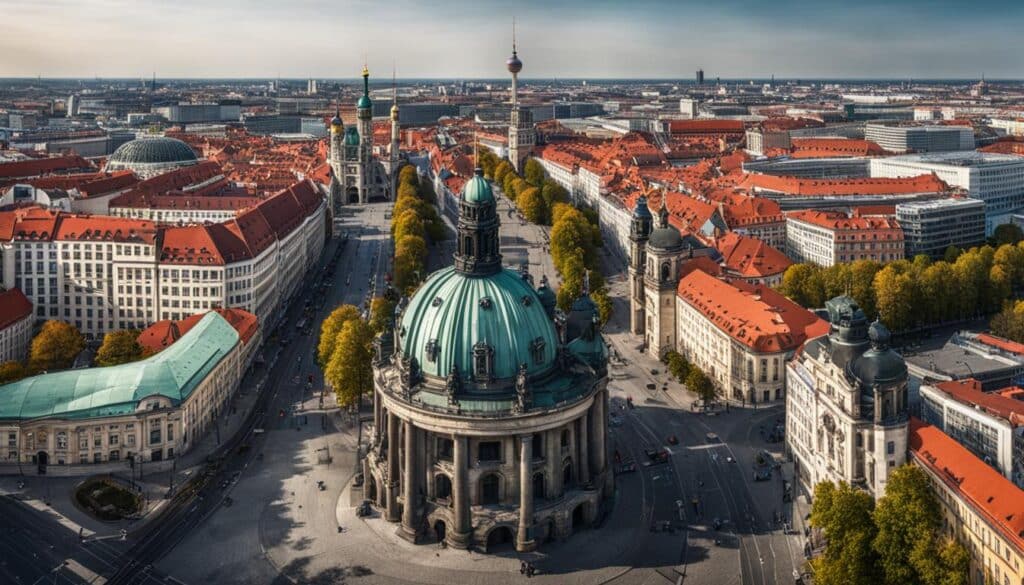
Berlin vs Munich Poulation table
| City | Population | Attractions | Culture |
|---|---|---|---|
| Berlin | Approximately 3.7 million | Vibrant arts scene, historic landmarks | Alternative, diverse, creative |
| Munich | Approximately 1.5 million | Bavarian charm, palaces, beer gardens | Traditional, cosmopolitan, Oktoberfest |
History
Let’s delve into the rich history of Berlin and Munich, two cities that have played pivotal roles in shaping Germany’s past. Berlin’s history is marked by significant events, making it a city of immense historical importance. From the division of the city during the Cold War to the fall of the Berlin Wall, Berlin has been a witness to dramatic political, cultural, and social changes throughout the 20th century. These events have left a lasting impact on the city’s identity and have made it a symbol of resilience and reunification.
Munich, on the other hand, has a more traditional and stable history. While it may not have experienced the same level of political upheaval as Berlin, Munich is known for its significant historical contributions. It played a key role in the rise of the Nazi party, with Adolf Hitler using the city as a base for his political activities. Munich has also been a center of innovation and economic growth, contributing to Germany’s industrial and technological advancements.
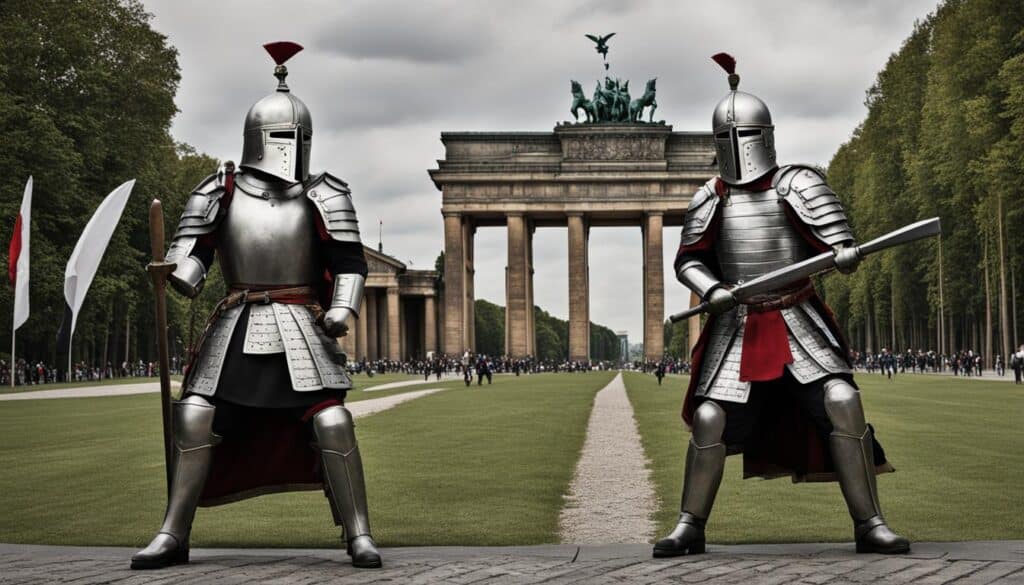
Both cities have museums, memorials, and historical sites that glimpse their respective pasts. Berlin is home to iconic landmarks like the Brandenburg Gate, Checkpoint Charlie, and the Berlin Wall Memorial. Munich, on the other hand, boasts architectural treasures such as the Nymphenburg Palace, the Residenz, and the Frauenkirche.
Exploring the history of Berlin vs Munich allows visitors to understand better the cultural, social, and political influences that have shaped these vibrant cities. Whether strolling through Berlin’s remnants of the Wall or marveling at Munich’s grandeur, both cities offer a fascinating journey into the past.
Cost of Living in Munich vs Berlin
When deciding between Berlin and Munich, one important factor to consider is the cost of living. Both cities offer unique experiences and attractions, but there are differences in affordability.
In general, Berlin is considered to be more affordable than Munich. The cost of accommodation, food, and transportation tends to be lower in Berlin compared to Munich. For example, rental prices in Berlin are generally lower, allowing for more budget-friendly options. Additionally, dining out and groceries may also be cheaper in Berlin.
However, it’s important to note that both cities have a range of options for different budgets. Munich, although generally more expensive, offers higher-end shopping and dining experiences that may be worth the extra cost for some visitors. Ultimately, deciding which city is more affordable depends on individual preferences and priorities.
Both cities have a housing shortage and I find the difference in costs are becoming similar.
| Cost of Living Factors | Berlin | Munich |
|---|---|---|
| Accommodation | Lower rental prices compared to Munich | Higher rental prices compared to Berlin |
| Food | Lower prices for dining out and groceries | Potentially higher prices for dining out and groceries |
| Transportation | Lower public transportation costs | Slightly higher public transportation costs |
“The cost of living in Berlin is more affordable compared to Munich, especially when it comes to accommodation and daily expenses. However, Munich offers a higher standard of living and luxury options that may be worth the extra cost for some individuals.” – Traveler’s Choice Magazine
Considerations for Cost of Living
- Personal budget and financial situation
- Preferred lifestyle and spending habits
- Desired standard of living
- Length of stay in the city
It’s worth noting that these factors are just a starting point for considering the cost of living It’s recommended to do further research and compare specific expenses based on individual circumstances and priorities.
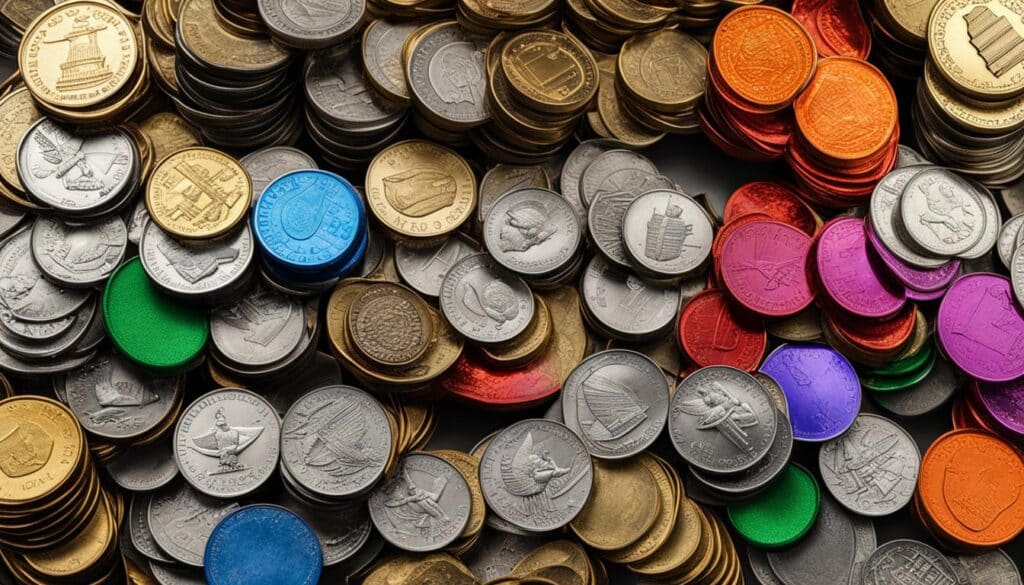
Transport
When it comes to getting around, both have efficient and well-developed public transportation systems. In Berlin, you can easily navigate the city using the extensive network of buses, trams, and trains. The public transport system in Munich is equally reliable and convenient, with options such as buses, trams, and the U-Bahn (subway).
For those who prefer a more active way of exploring the cities, both offer bike rental services, allowing you to pedal your way through the streets and take in the sights at your own pace. Additionally, taxis are readily available in both cities for those who prefer a more private and convenient mode of transportation.
Whether you’re hopping on a tram in Berlin or taking the U-Bahn in Munich, the public transport options in both cities make it easy to navigate and explore all the attractions, neighborhoods, and hidden gems they have to offer.
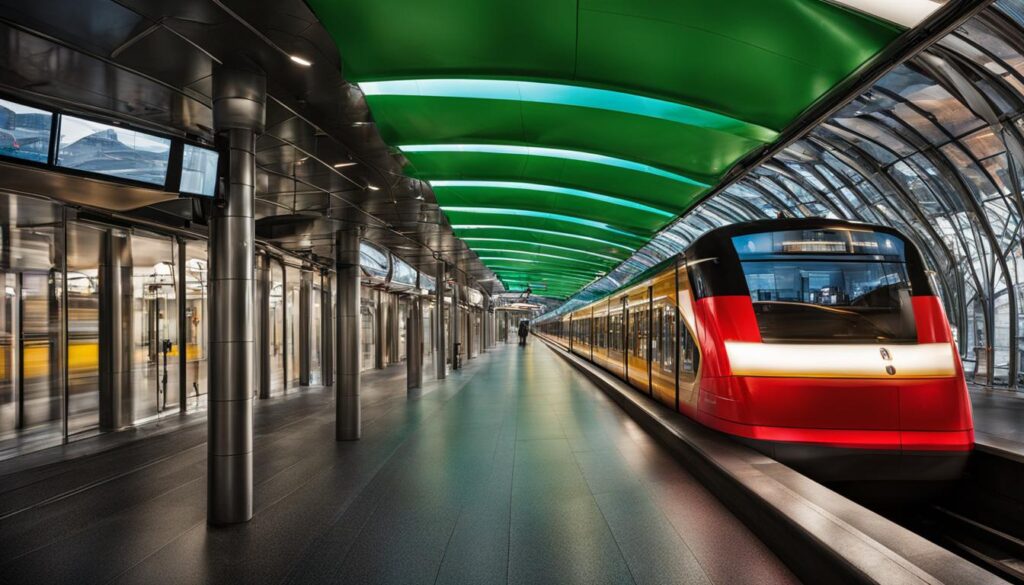
| Transportation Options | Berlin | Munich |
|---|---|---|
| Buses | Extensive network covering the entire city | Well-connected routes throughout the city |
| Trams | Convenient trams that reach various neighborhoods | Trams available in key areas of the city |
| Trains | S-Bahn and regional trains connecting Berlin with its suburbs | S-Bahn and regional trains providing easy access to surrounding areas |
| U-Bahn | Extensive subway network serving the city center and beyond | Efficient subway system with multiple lines and stations |
| Bike Rental | Multiple bike rental services available for a more active way of exploring | Bike rental options for those who prefer cycling around the city |
| Taxis | Readily available taxi services for a more private and convenient mode of transportation | Taxis widely accessible throughout the city for hassle-free travel |
Berlin vs Munich: Climate Comparison
When it comes to climate, the two cities experience similar weather patterns.
The cities have cold winters and mild summers, making them ideal destinations to visit throughout the year. The average temperature in summer ranges from 18 to 23 degrees Celsius, providing pleasant conditions for outdoor activities. In winter, temperatures can drop to around freezing, creating a picturesque winter wonderland.
Both cities experience some precipitation throughout the year, with slightly more rainfall in Berlin compared to Munich.
To give you a better understanding of the climate differences between Berlin and Munich, let’s take a look at the average temperatures and rainfall in both cities:
| Berlin | Munich | |
|---|---|---|
| Average Summer Temperature | 18-23°C | 18-23°C |
| Average Winter Temperature | Around freezing | Around freezing |
| Rainfall | Slightly higher | Less |
As you can see, the climate is quite similar, with minor variations in rainfall. Whether you prefer the slightly milder temperatures of Munich or the vibrant atmosphere of Berlin, both cities offer enjoyable climates for exploration and sightseeing.
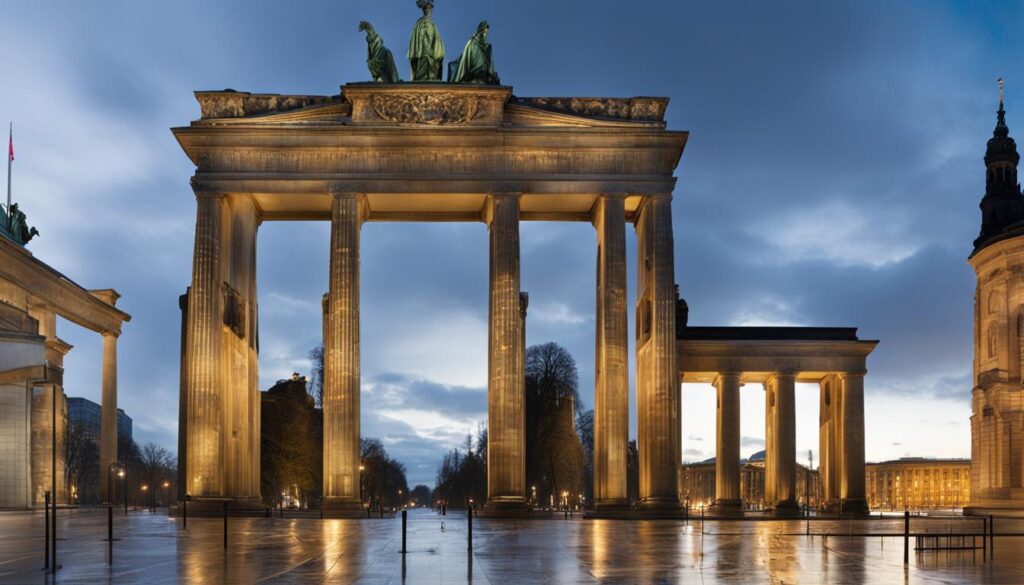
Exploring the Seasons
Each season brings its own unique charm to Berlin and Munich. In the spring, the cities come alive with blooming flowers and outdoor festivals. Summer is the perfect time to explore parks, enjoy outdoor dining, and soak up the sun. In the fall, they are adorned with autumn colors, making it an ideal time for scenic walks and visits to historical sites. Winter brings a magical atmosphere, with Christmas markets and snow-covered streets providing a cozy ambiance.
in my opinion, both have excellent infrastructure to handle fluctuating weather conditions. From indoor attractions and museums to cozy cafes and restaurants, there are plenty of options for when the weather isn’t ideal.
“The climate in Berlin and Munich offers a diverse range of experiences throughout the year, ensuring that visitors can enjoy the cities no matter the season.” – Traveler’s Digest
Whether you prefer mild temperatures or snowy landscapes, both Berlin and Munich offer a climate that enhances their unique cultural offerings and attractions. The choice between the two cities ultimately depends on your personal preferences and the time of year you plan to visit.
Safety and Security
When it comes to safety and security, both Berlin and Munich are considered safe cities to visit. They have relatively low crime rates and prioritize the well-being of residents and tourists. However, as with any major city, it is important to exercise caution and be aware of your surroundings, especially in crowded tourist areas.
In Berlin, the city offers a range of safety measures to ensure the security of its residents and visitors. The police presence is strong, and there are security cameras installed in public spaces to monitor activity. Additionally, emergency services are readily available throughout the city.
Munich also places a high emphasis on safety and security. The city has a well-trained police force and a comprehensive network of surveillance cameras. Visitors can feel safe knowing that the city takes measures to protect its residents and maintain a secure environment.
Both cities have implemented measures to enhance safety in public transportation systems. Berlin and Munich have well-developed systems that are generally considered safe to use. However, it is always recommended to take standard safety precautions such as keeping an eye on your belongings and staying alert while traveling.
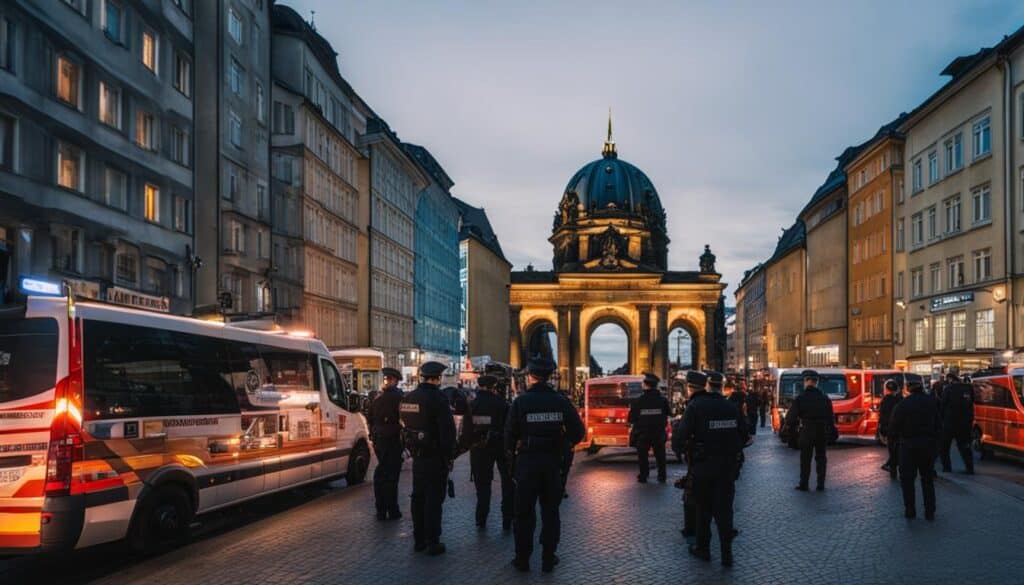
Key Points:
- Both are generally safe cities to visit.
- Both cities have low crime rates and prioritize security.
- There is a strong police presence and surveillance measures in place.
- Public transportation systems in both cities are considered safe.
Berlin is well known for a higher crime rate – and especially things like bikes it is important to follow common sense safety guidelines to ensure a pleasant and secure experience.
In berlin, 2021 around 25,000 bikes were stolen, whilst in Munich it was around 5,500 although important to remember Munich is about 2.8xx smaller population.
Health and Wellness
In this section, I will discuss the healthcare systems and wellness facilities available in both . Whether you’re a local resident or a visitor in need of medical services, both cities offer well-developed healthcare infrastructures to meet your needs.
| Berlin | Munich | |
|---|---|---|
| Healthcare Services | Berlin has a wide range of healthcare services, including hospitals, clinics, and specialist centers. The city is home to some of Germany’s top medical facilities, renowned for their expertise and advanced treatments. | Munich also boasts a comprehensive healthcare system, providing access to hospitals, clinics, and specialized medical centers. The city is known for its high standard of medical care and state-of-the-art facilities. |
| Wellness Facilities | Berlin offers various wellness facilities, such as spas, fitness centers, and wellness retreats. Whether you’re looking for a relaxing massage, a workout session, or holistic therapies, Berlin has a wide range of options to promote your well-being. | Munich is also home to numerous wellness facilities, including spas, fitness clubs, and wellness resorts. The city’s focus on health and wellness ensures that residents and visitors have access to a range of options for relaxation and self-care. |
| Tourism | Berlin’s tourism sector is well-equipped to cater to visitors’ health and wellness needs. There are wellness hotels, yoga studios, and wellness tours available, allowing tourists to explore the city while prioritizing their well-being. | Munich’s tourism industry also offers a wide range of health and wellness options for travelers. From luxury wellness resorts to outdoor activities in the Bavarian countryside, Munich provides opportunities for tourists to rejuvenate and unwind. |
visitors should have adequate travel health insurance to cover any medical expenses. It is also important to note that Germany has a highly advanced healthcare system, ensuring that you have access to quality medical care in case of emergencies or routine check-ups.
Key Takeaways
- Munich and Berlin have well-developed healthcare systems, offering hospitals, clinics, and specialist centers.
- Both cities provide a range of wellness facilities, including spas, fitness centers, and wellness retreats.
- Munich and Berlin tourism sectors cater to the health and wellness needs of visitors, with wellness hotels, yoga studios, and wellness tours available.
- It is important for visitors to have adequate travel health insurance to cover any medical expenses while in Germany.
Education
When it comes to education, both Munich and Berlin are home to renowned universities and research institutions. These cities offer a wide range of educational opportunities for both domestic and international students. Berlin’s universities are known for their focus on the arts, humanities, and social sciences, providing a diverse and creative learning environment. Munich’s universities, on the other hand, excel in areas such as engineering, sciences, and business, attracting students who are seeking a more technical and business-oriented education.
The Universities in Berlin
In Berlin, students have access to several prestigious universities. One notable institution is Humboldt University, which is known for its strong academic reputation and historical significance. It offers a wide variety of programs across disciplines, including humanities, social sciences, natural sciences, and law. Another renowned university in Berlin is the Free University of Berlin, which is known for its research-oriented approach and innovative programs. It is particularly strong in the fields of political science, economics, and international relations.
The Universities in Munich
Munich is home to several top-tier universities that attract students from around the world. One of the most prestigious institutions is Ludwig Maximilian University of Munich, which consistently ranks among the best universities in Germany. It offers a wide range of programs, with particular strengths in the fields of medicine, natural sciences, and humanities. Another notable university in Munich is the Technical University of Munich, renowned for its excellence in engineering and technology-related disciplines. It is a popular choice for students pursuing degrees in fields such as mechanical engineering, computer science, and electrical engineering.
| Universities in Berlin | Universities in Munich |
|---|---|
| Humboldt University | Ludwig Maximilian University of Munich |
| Free University of Berlin | Technical University of Munich |
| Charité – Universitätsmedizin Berlin | LMU Munich School of Management |
In our battle of Berlin vs Munich both provide a vibrant and stimulating academic environment with opportunities for research, cultural exchange, and personal growth. Whether you are interested in the liberal arts and humanities or the sciences and technology, both cities offer a wide range of educational options to suit your interests and aspirations.
Jobs and Economy: Berlin vs Munich
Regarding job opportunities and economic prospects, both have a lot to offer. They are vibrant cities with diverse industries and growing business sectors. Let’s look closer at the job markets and business opportunities in these cities.
The Job Market in Berlin
In recent years, Berlin has emerged as a hub for startups and innovation. The city is known for its creative and entrepreneurial spirit, attracting young professionals and investors from around the world. Berlin’s job market is diverse, offering opportunities in industries such as technology, media, design, and tourism.
The city is also home to numerous research institutes and universities, providing ample opportunities in the education and research sectors. With a lower cost of living than other major European cities, Berlin has become an attractive destination for young professionals looking for career growth and opportunities.
The Job Market in Munich
Munich, on the other hand, is known for its strong economy and thriving industries. The city is a major center for technology, finance, and automotive sectors. It is home to several multinational companies and renowned research institutions. Munich’s job market offers opportunities in fields such as engineering, finance, IT, and healthcare. The city’s stable economy and high standard of living make it a desirable location for professionals seeking long-term career prospects. With a focus on quality and innovation, Munich provides a favorable environment for professionals looking to excel in their respective fields.
| Job Market | Business Opportunities | |
|---|---|---|
| Berlin | Diverse job market with a focus on startups and creative industries | Opportunities in technology, media, design, and tourism sectors |
| Munich | Strong economy with opportunities in technology, finance, and automotive industries | Business-friendly environment with multinational companies and research institutions |
The two cities offer unique advantages when it comes to jobs and business opportunities. Berlin’s dynamic startup scene and creative industries provide a fertile ground for innovation and career growth. On the other hand, Munich’s stable economy and focus on technology and finance make it an attractive destination for professionals seeking established companies and long-term career prospects. Ultimately, the choice between for Berlin vs Munich depends on your preferences, career goals, and the industry you wish to work in.
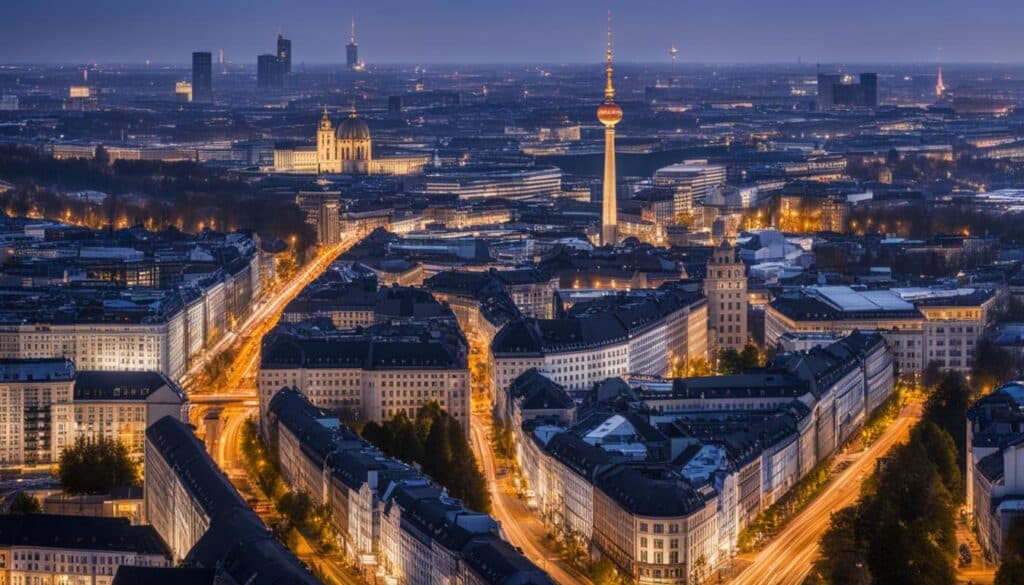
Culture and Art
When it comes to culture and art, both Munich and Berlin have a rich and vibrant scene that showcases their unique cultural significance. Berlin is known for its alternative and experimental arts scene, while Munich offers a more traditional and classical experience.
Berlin: A Hub of Creativity
In Berlin, creativity is everywhere you look. The city is home to numerous art galleries, museums, and theaters, making it a haven for artists and art enthusiasts. From the iconic East Side Gallery, which features the longest remaining section of the Berlin Wall covered in vibrant street art, to the world-renowned Museum Island, Berlin offers a diverse range of artistic experiences.
One of the highlights of Berlin’s cultural scene is its thriving street art culture, with colorful murals and graffiti adorning buildings throughout the city. The street art scene has become so popular that guided tours are available for visitors to explore this unique form of artistic expression.
Munich: Tradition and Beauty
Munich, on the other hand, is a city that proudly showcases its rich cultural heritage. The city is home to some of the most prestigious museums and galleries in the world, such as the Alte Pinakothek, which houses an extensive collection of European art ranging from the Middle Ages to the 18th century.
For those interested in classical music and opera, Munich offers world-class performances at venues like the National Theater and the Bavarian State Opera. The city also hosts the annual Munich Opera Festival, which attracts opera lovers from around the globe.
| Berlin | Munich |
|---|---|
| Trend-setting contemporary art scene with numerous galleries and museums | Rich cultural heritage with world-class museums and classical music performances |
| Street art culture and vibrant graffiti scene | Annual Munich Opera Festival showcasing classical music and opera |
| Experimental and alternative theater performances | Traditional Bavarian folk culture and festivals |
Both cities offer a unique cultural experience catering to different artistic tastes. Whether you’re drawn to Berlin’s avant-garde art scene or Munich’s classical beauty, both cities will leave a lasting impression on art lovers.
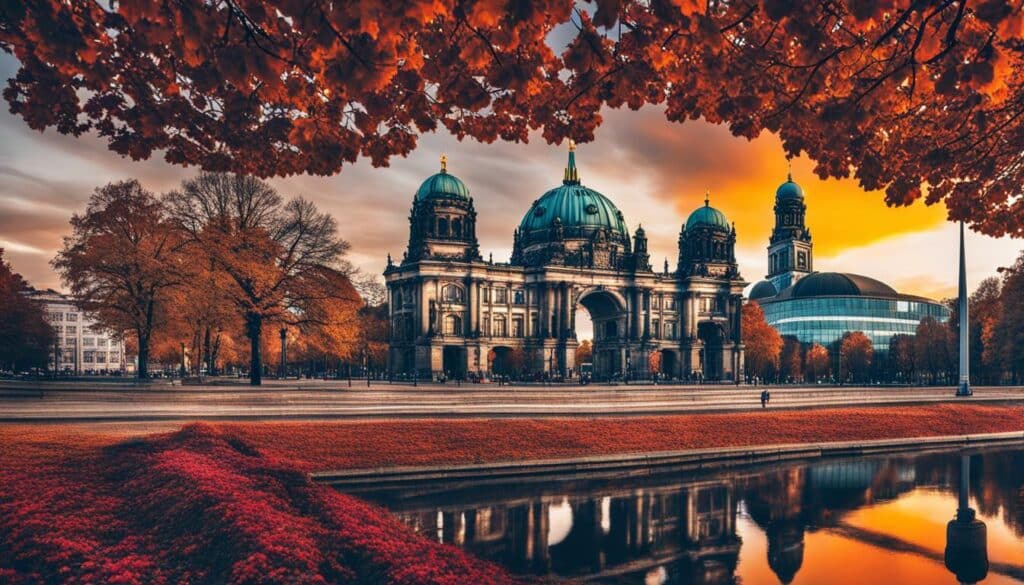
Berlin vs Munich: Exploring the Culinary Delights
When it comes to cuisine, both Munich and Berlin offer a delightful array of culinary experiences. From international flavors to traditional German dishes, food enthusiasts will find something to satisfy their taste buds in both cities.
In Berlin, the food scene is known for its diversity and innovation. The city is a melting pot of cultures, reflected in its wide range of international cuisines. Whether you’re craving Thai street food, Turkish kebabs, or vegan delights, Berlin has it all. Don’t forget to explore the city’s bustling food markets, such as Markthalle Neun, where you can indulge in local specialties and artisanal products.
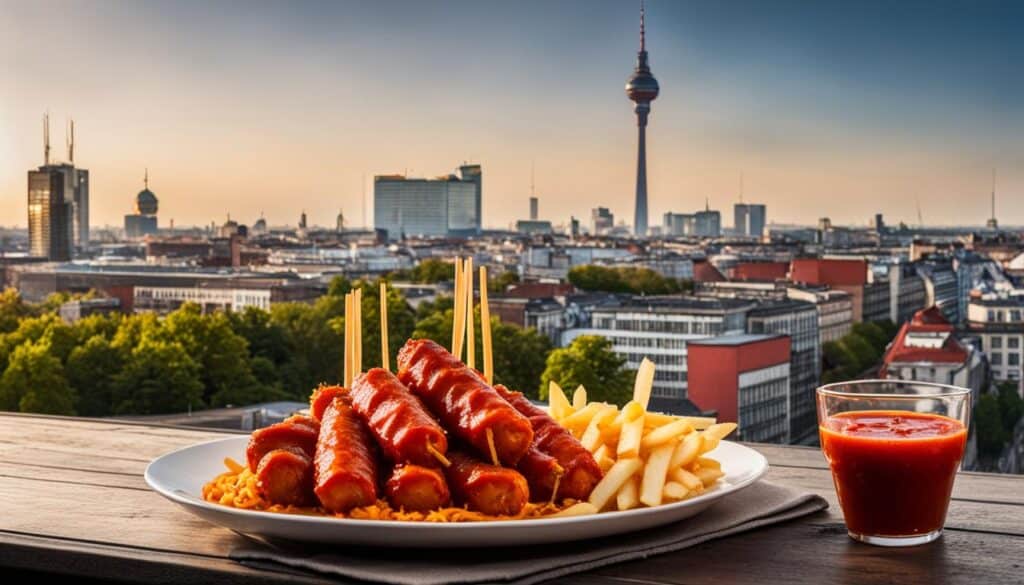
Munich, on the other hand, is revered for its traditional Bavarian cuisine. Indulge in hearty dishes like Weisswurst (white sausage), Pretzels, and Schweinshaxe (roasted pork knuckle) while sipping on a refreshing Maß (liter mug) of beer. Don’t miss the opportunity to visit the historic beer halls and beer gardens, such as the iconic Hofbräuhaus, where you can experience the true essence of Bavarian culture.
Berlin vs Munich Cuisine
| Berlin | Munich | |
|---|---|---|
| Cuisine | Diverse, international | Traditional Bavarian |
| Specialties | Doner kebab, currywurst, falafel | Weisswurst, pretzels, Schweinshaxe |
| Food Markets | Markthalle Neun, Turkish Market | Viktualienmarkt, Elisabethmarkt |
| Beer Culture | N/A | Hofbräuhaus, beer gardens |
| Vegetarian/Vegan Options | Abundant | Available but limited |
“Berlin’s food scene is a kaleidoscope of flavors, with a vibrant street food culture that will take you on a culinary journey around the world.”
“Munich’s traditional Bavarian cuisine offers a hearty and authentic dining experience, best enjoyed with a pint of beer in one of the city’s historic beer halls.”
Whether you’re a fan of international cuisine or crave the comfort of traditional German dishes, both will leave you satisfied. Explore the diverse food scene of Berlin or indulge in the rich flavors of Bavarian cuisine in Munich – it’s a culinary adventure you won’t want to miss.
Nightlife
When it comes to nightlife, both Berlin and Munich have their unique offerings. Berlin is renowned for its vibrant and eclectic scene, attracting partygoers from all over the world. The city is home to some of the best clubs and music venues, catering to a diverse range of tastes. From the legendary Berghain, known for its techno music, to the trendy Watergate and the iconic KitKatClub, Berlin’s nightlife scene is unrivaled in its diversity and energy. Whether you’re into electronic music, live bands, or underground parties, Berlin has something for everyone.
Munich, while not as famous for its nightlife, still offers a lively and enjoyable experience. The city is known for its traditional beer gardens, where locals and visitors gather to enjoy a refreshing pint of beer in a relaxed and convivial atmosphere. Munich’s nightlife scene also includes a variety of bars and clubs that cater to different tastes. From the stylish P1 nightclub to the trendy Lost Weekend, Munich offers a more sophisticated and refined nightlife experience.
Whether you prefer the wild and alternative atmosphere of Berlin or the traditional and sophisticated charm of Munich, both cities guarantee a memorable night out. So, whether you’re looking to dance the night away in Berlin’s legendary clubs or enjoy a laid-back evening in a Munich beer garden, you’re sure to find a nightlife experience that suits your preferences in these two vibrant German cities.
Shopping and Attractions
Regarding shopping and attractions, both Berlin and Munich offer a wide range of options to explore. From top attractions to unique shopping experiences, these cities have something for everyone.
Top Attractions
Is Munich or Berlin better when it comes tohistorical and cultural landmarks that are must-see attractions for visitors. Both boast a wealth of things to do.
| City | Top Attractions |
|---|---|
| Berlin | 1. Brandenburg Gate 2. Berlin Wall Memorial 3. Museum Island 4. Reichstag Building 5. Checkpoint Charlie |
| Munich | 1. Marienplatz 2. Nymphenburg Palace 3. English Garden 4. Munich Residenz 5. BMW Museum |
These iconic landmarks offer a glimpse into the rich history and architectural beauty of both cities.
Shopping Experiences
When it comes to shopping, each city offers distinct experiences catering to different tastes and preferences.
“Berlin is known for its trendy boutiques and vintage stores, offering a unique shopping experience for fashion-forward individuals. The famous Kurfürstendamm street is a shopper’s paradise, lined with luxury brands and department stores. On the other hand, Munich is renowned for its luxury shopping, with Maximilianstrasse being the go-to destination for high-end fashion and jewelry. The city also boasts traditional markets like Viktualienmarkt, where you can indulge in locally sourced produce, delicacies, and souvenirs.”
Whether you’re a fashion enthusiast searching for the latest trends or someone who appreciates handmade crafts and local products, both cities have something to offer.
With a plethora of shopping options and top attractions, each city provides a delightful blend of historical significance, cultural richness, and memorable experiences for all visitors.
Conclusion
After comparing the various aspects of between the cities, it’s clear that both cities offer unique experiences and attractions. Berlin, with its vibrant arts scene, alternative culture, and diverse food options, appeals to those seeking an urban and creative atmosphere. On the other hand, Munich stands out with its traditional Bavarian charm, classical cultural offerings, and world-famous beer gardens.
When deciding which city to visit, it ultimately comes down to personal preferences and interests. If you’re drawn to the energetic and avant-garde side of Germany, then Berlin is the place for you. With its rich history and thriving nightlife, it will cater to your adventurous spirit. On the other hand, if you prefer a more traditional and classical experience, Munich’s architecture, museums, and traditional cuisine will captivate you.
Whether you choose Berlin or Munich, both cities ensure an unforgettable stay in Germany. So, pack your bags, immerse yourself in the rich culture, and embark on a journey that will leave you with memories to cherish for a lifetime.
FAQ
Is Berlin or Munich more affordable to visit?
Berlin is generally considered more affordable than Munich regarding accommodation, food, and transportation although Berlin is quickly catching up.
What is the public transportation like?
Both cities have efficient public transportation systems, including buses, trams, and trains in Berlin, and buses, trams, and the U-Bahn (subway) in Munich.
Is there much of a climate difference?
Both cities have cold winters and mild summers, with temperatures ranging from 18 to 23 degrees Celsius in summer and dropping to freezing temperatures in winter.
Which city is safer to visit?
Yes, both cities have low crime rates and strongly emphasize security. However, it is always important to exercise caution and be aware of your surroundings, especially in crowded tourist areas. Overall, from personal experience Munich feels much safer.
What healthcare facilities are available in Berlin vs Munich?
Both cities have well-developed healthcare systems and offer quality medical services, including hospitals, clinics, and specialist centers.
What educational opportunities are there in Berlin and Munich?
Both cities are home to renowned universities and research institutions, offering various educational opportunities in various fields of study. TUM has probably the most entrepreneur -minded students of any university in Germany. Humboldt University is renowned for its prestigious humanities and social science programs.
How to the two cities compare with job opportunities?
Berlin has a strong focus on government and public sector jobs, as well as a growing startup scene. Munich is a major center for technology, finance, and automotive industries. Munich salaries tend to be higher, both cities have an abundance of English speaking jobs.
What cultural attractions are there?
Berlin is known for its vibrant arts scene, with numerous art galleries, museums, and theaters. Munich offers a more traditional and classical cultural experience, with renowned opera houses and museums.
What types of cuisine can I try?
Berlin offers a diverse food scene with various international cuisines and street food options. Munich is famous for its traditional Bavarian cuisine, including sausages, pretzels, and beer.
What is the nightlife like in Berlin vs Munich?
Berlin is famous for its vibrant and eclectic nightlife, with numerous clubs, bars, and music venues. You can party 24/7 in Berlin. Munich also offers a lively scene with beer gardens, traditional pubs, and trendy bars although unlikely to start on Friday and end on Monday parties.
What are the top shopping and attractions?
Both cities offer a variety of shopping options and top attractions, with Berlin known for trendy boutiques and famous shopping streets and Munich renowned for luxury shopping and traditional markets.